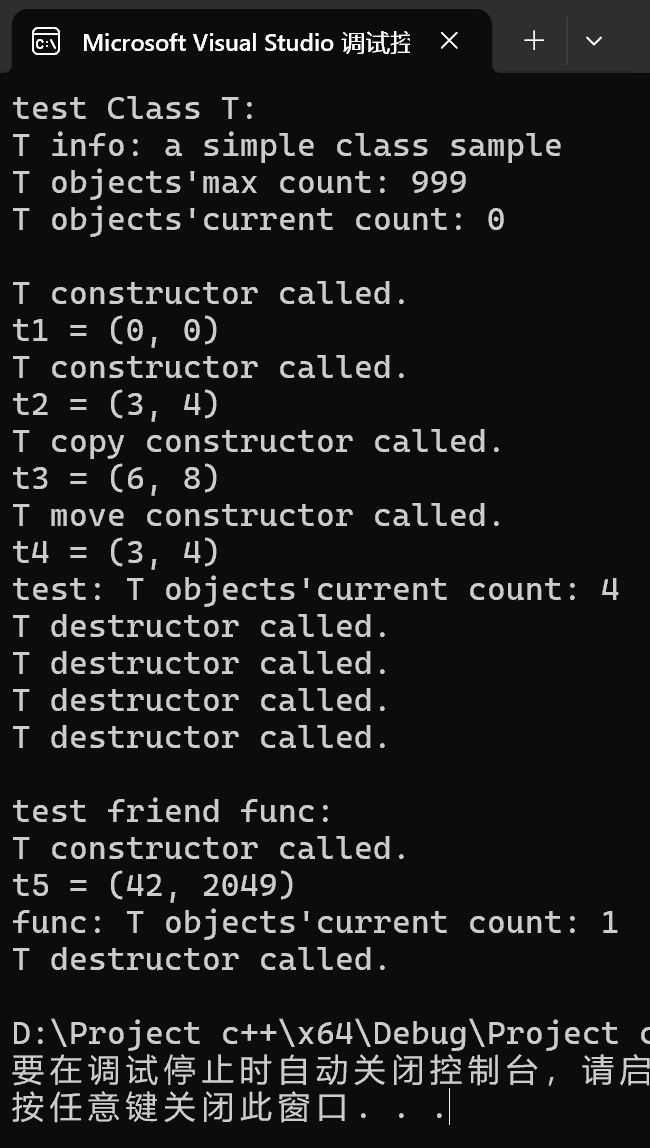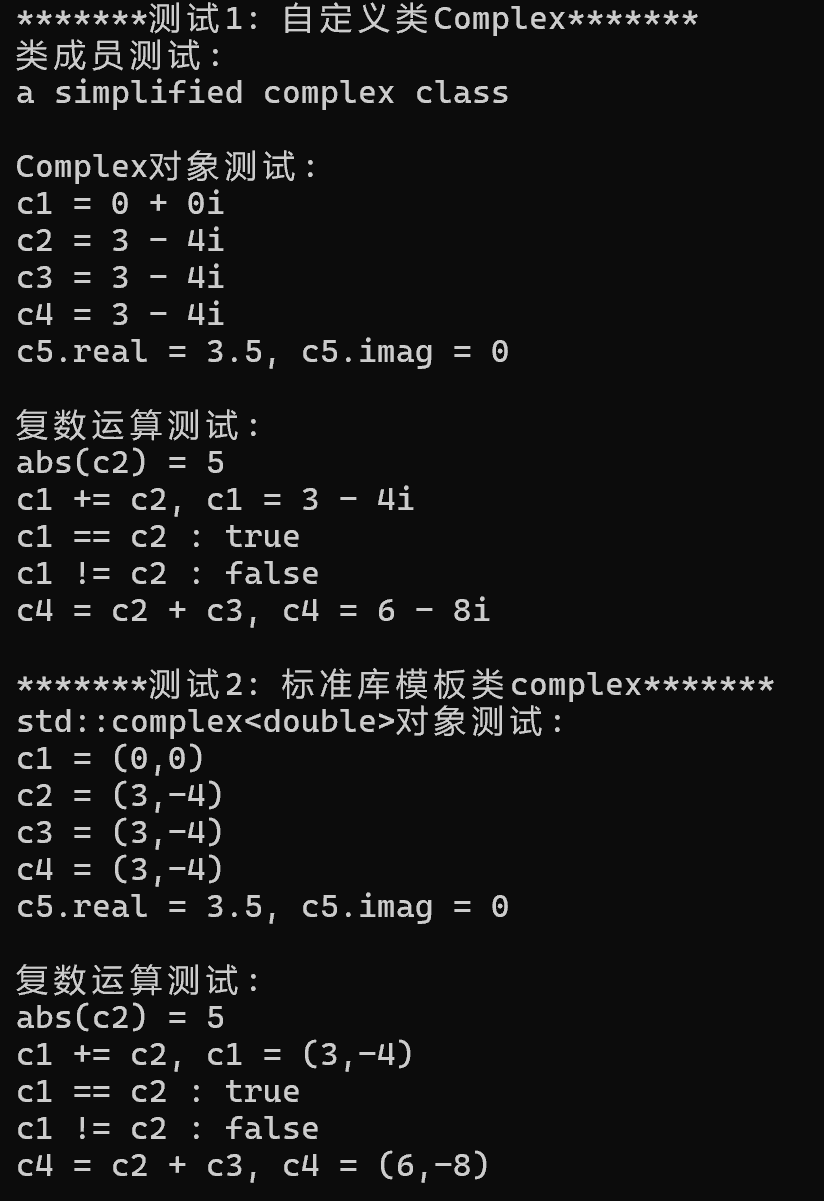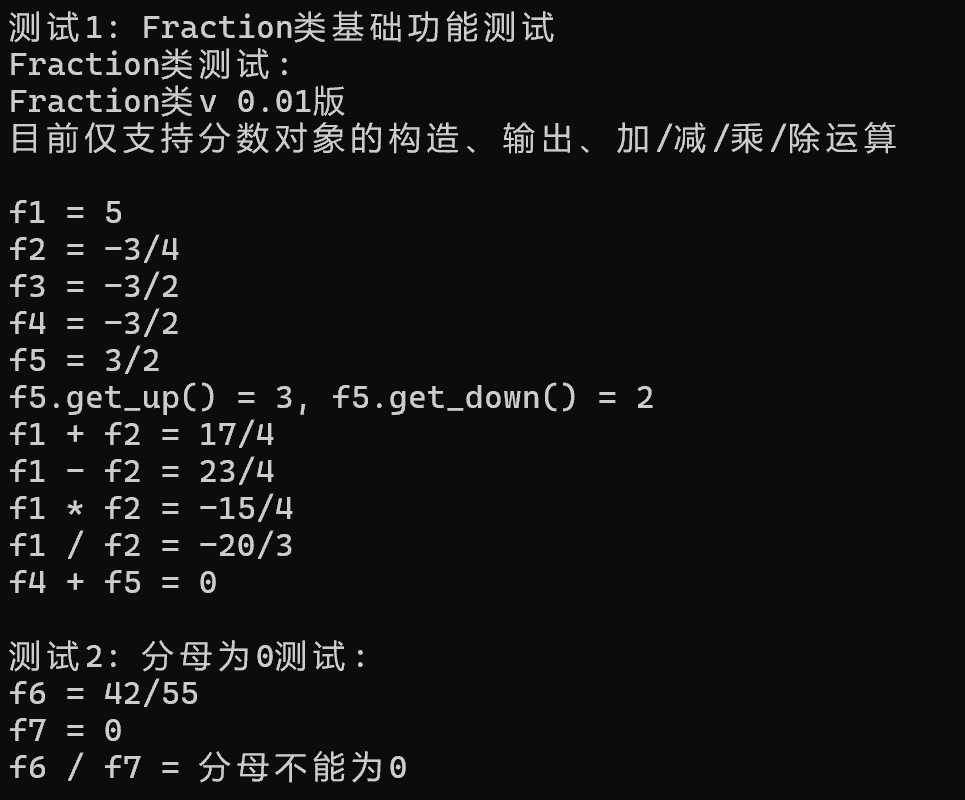实验2
task 1
T.h

1 #pragma once 2 3 #include <string> 4 5 class T { 6 public: 7 T(int x = 0, int y = 0); 8 T(const T& t); 9 T(T&& t); 10 ~T(); 11 void adjust(int ratio); 12 void display() const; 13 private: 14 int m1, m2; 15 16 public: 17 static int get_cnt(); 18 19 public: 20 static const std::string doc; 21 static const int max_cnt; 22 23 private: 24 static int cnt; 25 friend void func(); 26 }; 27 28 void func();
T.cpp

1 #include "T.h" 2 #include <iostream> 3 #include <string> 4 5 const std::string T::doc{ "a simple class sample" }; 6 const int T::max_cnt = 999; 7 int T::cnt = 0; 8 9 int T::get_cnt() { 10 return cnt; 11 } 12 13 T::T(int x, int y) : m1{ x }, m2{ y } { 14 ++cnt; 15 std::cout << "T constructor called.\n"; 16 } 17 18 T::T(const T& t) : m1{ t.m1 }, m2{ t.m2 } { 19 ++cnt; 20 std::cout << "T copy constructor called.\n"; 21 } 22 23 T::T(T&& t) : m1{ t.m1 }, m2{ t.m2 } { 24 ++cnt; 25 std::cout << "T move constructor called.\n"; 26 } 27 28 T::~T() { 29 --cnt; 30 std::cout << "T destructor called.\n"; 31 } 32 33 void T::adjust(int ratio) { 34 m1 *= ratio; 35 m2 *= ratio; 36 } 37 38 void T::display() const { 39 std::cout << "(" << m1 << ", " << m2 << ")"; 40 } 41 42 void func() { 43 T t5(42); 44 t5.m2 = 2049; 45 std::cout << "t5 = "; t5.display(); std::cout << '\n'; 46 std::cout << "func: T objects'current count: " << T::get_cnt() << std::endl; 47 }
task 1.cpp

1 #include "T.h" 2 #include <iostream> 3 4 void test_T(); 5 6 int main() { 7 std::cout << "test Class T: \n"; 8 test_T(); 9 std::cout << "\ntest friend func: \n"; 10 func(); 11 } 12 13 void test_T() { 14 using std::cout; 15 using std::endl; 16 17 cout << "T info: " << T::doc << endl; 18 cout << "T objects'max count: " << T::max_cnt << endl; 19 cout << "T objects'current count: " << T::get_cnt() << endl << endl; 20 21 T t1; 22 cout << "t1 = "; t1.display(); cout << endl; 23 24 T t2(3, 4); 25 cout << "t2 = "; t2.display(); cout << endl; 26 27 T t3(t2); 28 t3.adjust(2); 29 cout << "t3 = "; t3.display(); cout << endl; 30 31 T t4(std::move(t2)); 32 cout << "t4 = "; t4.display(); cout << endl; 33 34 cout << "test: T objects'current count: " << T::get_cnt() << endl; 35 }

Q1:

friend 只声明了func是T类的友元,并没有定义func这个函数,所以在主函数里找不到标识符func
Q2:
T(int x=0,int y=0):普通构造函数
功能:初始化类的对象,为成员变量分配内存并赋予初始值(若没填写参数则默认为0)
调用时机:创建类的对象时调用
T(const T &t):复制构造函数
功能:用已经存在的类对象初始化新的类对象(深拷贝)
调用时机:用已有的对象初始化新的对象时调用,T t2{t1}
T(T &&t):移动构造函数
功能:将临时对象用右值引用的方式移动到新对象中
调用时机:用右值初始化新对象时调用,T t2=std::move(t1)
~T():析构函数
功能:释放类的对象占用内存
调用时机:类对象生命周期结束时调用
Q3:

静态成员变量的定义需在类外且仅定义一次,若将定义放在头文件中,头文件被多个源文件包含时会导致重复定义
task 2
Complex.h
1 #pragma once 2 3 #include<string> 4 5 class Complex 6 { 7 public: 8 Complex(double a = 0, double b = 0); 9 Complex(const Complex& c); 10 ~Complex(); 11 12 double get_real() const; 13 double get_imag() const; 14 void add(const Complex& c); 15 16 static const std::string doc; 17 18 private: 19 double real, imag; 20 21 public: 22 friend void output(const Complex &c); 23 friend double abs(const Complex &c); 24 friend Complex add(const Complex& c1,const Complex& c2); 25 friend bool is_equal(const Complex& c1,const Complex& c2); 26 friend bool is_not_equal(const Complex& c1,const Complex& c2); 27 }; 28 29 void output(const Complex& c); 30 double abs(const Complex& c); 31 Complex add(const Complex& c1, const Complex& c2); 32 bool is_equal(const Complex& c1, const Complex& c2); 33 bool is_not_equal(const Complex& c1, const Complex& c2);
Complex.cpp
1 #include "Complex.h" 2 #include<iostream> 3 #include<string> 4 #include<cmath> 5 6 const std::string Complex::doc{ "a simplified complex class" }; 7 8 Complex::Complex(double a, double b) :real{ a }, imag{ b } {} 9 Complex::Complex(const Complex &c):real{c.real},imag{c.imag}{} 10 Complex::~Complex(){} 11 12 double Complex::get_real() const { 13 return real; 14 } 15 16 double Complex::get_imag() const { 17 return imag; 18 } 19 20 void Complex::add(const Complex & c) { 21 real += c.real; 22 imag += c.imag; 23 } 24 25 void output(const Complex& c) { 26 std::cout << c.real; 27 28 if (c.imag >= 0) 29 std::cout << " + "; 30 else 31 std::cout << " - "; 32 33 std::cout << std::abs(c.imag) << "i"; 34 } 35 36 double abs(const Complex& c) { 37 return std::sqrt(c.real * c.real + c.imag * c.imag); 38 } 39 40 Complex add(const Complex& c1, const Complex& c2) { 41 double real = c1.real + c2.real; 42 double imag = c1.imag + c2.imag; 43 44 return Complex(real, imag); 45 } 46 47 bool is_equal(const Complex& c1, const Complex& c2) { 48 if (c1.real == c2.real && c1.imag == c2.imag) 49 return true; 50 else 51 return false; 52 } 53 54 bool is_not_equal(const Complex& c1, const Complex& c2) { 55 if (c1.real != c2.real || c1.imag != c2.imag) 56 return true; 57 else 58 return false; 59 }
task 2.cpp

1 #include"Complex.h" 2 3 #include <iostream> 4 #include <iomanip> 5 #include <complex> 6 7 void test_Complex(); 8 void test_std_complex(); 9 10 int main() { 11 std::cout << "*******测试1: 自定义类Complex*******\n"; 12 test_Complex(); 13 14 std::cout << "\n*******测试2: 标准库模板类complex*******\n"; 15 test_std_complex(); 16 } 17 18 void test_Complex() { 19 using std::cout; 20 using std::endl; 21 using std::boolalpha; 22 23 cout << "类成员测试: " << endl; 24 cout << Complex::doc << endl << endl; 25 26 cout << "Complex对象测试: " << endl; 27 Complex c1; 28 Complex c2(3, -4); 29 Complex c3(c2); 30 Complex c4 = c2; 31 const Complex c5(3.5); 32 33 cout << "c1 = "; output(c1); cout << endl; 34 cout << "c2 = "; output(c2); cout << endl; 35 cout << "c3 = "; output(c3); cout << endl; 36 cout << "c4 = "; output(c4); cout << endl; 37 cout << "c5.real = " << c5.get_real() 38 << ", c5.imag = " << c5.get_imag() << endl << endl; 39 40 cout << "复数运算测试: " << endl; 41 cout << "abs(c2) = " << abs(c2) << endl; 42 c1.add(c2); 43 cout << "c1 += c2, c1 = "; output(c1); cout << endl; 44 cout << boolalpha; 45 cout << "c1 == c2 : " << is_equal(c1, c2) << endl; 46 cout << "c1 != c2 : " << is_not_equal(c1, c2) << endl; 47 c4 = add(c2, c3); 48 cout << "c4 = c2 + c3, c4 = "; output(c4); cout << endl; 49 } 50 void test_std_complex() { 51 using std::cout; 52 using std::endl; 53 using std::boolalpha; 54 55 cout << "std::complex<double>对象测试: " << endl; 56 std::complex<double> c1; 57 std::complex<double> c2(3, -4); 58 std::complex<double> c3(c2); 59 std::complex<double> c4 = c2; 60 const std::complex<double> c5(3.5); 61 62 cout << "c1 = " << c1 << endl; 63 cout << "c2 = " << c2 << endl; 64 cout << "c3 = " << c3 << endl; 65 cout << "c4 = " << c4 << endl; 66 67 cout << "c5.real = " << c5.real() 68 << ", c5.imag = " << c5.imag() << endl << endl; 69 70 cout << "复数运算测试: " << endl; 71 cout << "abs(c2) = " << abs(c2) << endl; 72 c1 += c2; 73 cout << "c1 += c2, c1 = " << c1 << endl; 74 cout << boolalpha; 75 cout << "c1 == c2 : " << (c1 == c2) << endl; 76 cout << "c1 != c2 : " << (c1 != c2) << endl; 77 c4 = c2 + c3; 78 cout << "c4 = c2 + c3, c4 = " << c4 << endl; 79 }

Q1:在使用形式上,标准库模板类complex更简洁,函数和运算内在有关联
Q2-1:是。output输出要用到real和imag;abs取模要用到real和imag的运算;add要用real和imag来进行虚部和实部的相加运算,real和imag是私有数据
Q2-2:否。
Q2-3:当外部函数必须要直接用到类内部的私有数据时要用到friend
Q3:在public中添加Complex &operator=(const Complex)=delete;
task 3
PlayerControl.h

1 #pragma once 2 #include<string> 3 4 enum class ControlType { Play, Pause, Next, Prev, Stop, Unknown }; 5 6 class PlayerControl 7 { 8 public: 9 PlayerControl(); 10 ControlType parse(const std::string& control_str); 11 void execute(ControlType cmd) const; 12 13 static int get_cnt(); 14 15 private: 16 static int total_cnt; 17 };
PlayerControl.cpp
1 #include "PlayerControl.h" 2 #include <iostream> 3 #include <algorithm> 4 5 int PlayerControl::total_cnt = 0; 6 7 PlayerControl::PlayerControl() {} 8 9 ControlType PlayerControl::parse(const std::string& control_str) { 10 std::string ans; 11 ans.reserve(control_str.size()); 12 13 for (unsigned char ch : control_str) 14 ans += std::tolower(ch); 15 16 if (ans == "play") { 17 total_cnt++; 18 return ControlType::Play; 19 } 20 else if (ans == "pause") { 21 total_cnt++; 22 return ControlType::Pause; 23 } 24 else if (ans == "next") { 25 total_cnt++; 26 return ControlType::Next; 27 } 28 else if (ans == "prev") { 29 total_cnt++; 30 return ControlType::Prev; 31 } 32 else if (ans == "stop") { 33 total_cnt++; 34 return ControlType::Stop; 35 } 36 else { 37 total_cnt++; 38 return ControlType::Unknown; 39 } 40 } 41 42 void PlayerControl::execute(ControlType cmd) const { 43 switch (cmd) { 44 case ControlType::Play: std::cout << "[play] Playing music...\n"; break; 45 case ControlType::Pause: std::cout << "[Pause] Music paused\n"; break; 46 case ControlType::Next: std::cout << "[Next] Skipping to next track\n"; break; 47 case ControlType::Prev: std::cout << "[Prev] Back to previous track\n"; break; 48 case ControlType::Stop: std::cout << "[Stop] Music stopped\n"; break; 49 default: std::cout << "[Error] unknown control\n"; break; 50 } 51 } 52 53 int PlayerControl::get_cnt() { 54 return total_cnt; 55 }
task 3.cpp

1 #include "PlayerControl.h" 2 #include <iostream> 3 void test() { 4 PlayerControl controller; 5 std::string control_str; 6 std::cout << "Enter Control: (play/pause/next/prev/stop/quit):\n"; 7 while (std::cin >> control_str) { 8 if (control_str == "quit") 9 break; 10 ControlType cmd = controller.parse(control_str); 11 controller.execute(cmd); 12 std::cout << "Current Player control: " << PlayerControl::get_cnt() << "\n\n"; 13 } 14 } 15 16 int main() { 17 test(); 18 }

task 4
Fraction.h
1 #pragma once 2 #include<string> 3 4 class Fraction 5 { 6 public: 7 Fraction(int UP, int DOWN = 1); 8 Fraction(const Fraction& f); 9 ~Fraction(); 10 11 int get_up() const; 12 int get_down() const; 13 Fraction negative(); 14 15 static const std::string doc; 16 17 private: 18 int up, down; 19 20 public: 21 friend void output(const Fraction& f); 22 friend Fraction add(const Fraction& f1, const Fraction& f2); 23 friend Fraction sub(const Fraction& f1, const Fraction& f2); 24 friend Fraction mul(const Fraction& f1, const Fraction& f2); 25 friend Fraction div(const Fraction& f1, const Fraction& f2); 26 }; 27 28 void output(const Fraction& f); 29 Fraction add(const Fraction& f1, const Fraction& f2); 30 Fraction sub(const Fraction& f1, const Fraction& f2); 31 Fraction mul(const Fraction& f1, const Fraction& f2); 32 Fraction div(const Fraction& f1, const Fraction& f2);
Fraction.cpp
1 #include "Fraction.h" 2 #include<iostream> 3 #include<cmath> 4 #include <utility> 5 6 int gcd(int a, int b); 7 int lcm(int a, int b); 8 9 const std::string Fraction::doc{ "Fraction类v 0.01版\n目前仅支持分数对象的构造、输出、加/减/乘/除运算" }; 10 11 Fraction::Fraction(int UP, int DOWN) :up{ UP }, down{ DOWN }{} 12 Fraction::Fraction(const Fraction& f) :up{ f.up }, down{ f.down }{} 13 Fraction::~Fraction(){} 14 15 int Fraction::get_up() const { 16 int new_up = up / gcd(up, down); 17 return new_up; 18 } 19 20 int Fraction::get_down() const { 21 int new_down = down / gcd(up, down); 22 return new_down; 23 } 24 25 Fraction Fraction::negative() { 26 int a = 0 - up; 27 return Fraction(a, down); 28 } 29 30 void output(const Fraction& f) { 31 if (f.down == 0) return; 32 if (f.up == 0) { 33 std::cout << 0; 34 return; 35 } 36 37 int t = gcd(f.up, f.down); 38 int new_up = f.up / t; 39 int new_down = f.down / t; 40 41 if (new_down == 1) 42 std::cout << std::abs(new_up); 43 else { 44 if ((new_up > 0 && new_down > 0) || (new_up < 0 && new_down < 0)) 45 std::cout << std::abs(new_up) << "/" << std::abs(new_down); 46 else 47 std::cout << "-" << std::abs(new_up) << "/" << std::abs(new_down); 48 } 49 } 50 51 Fraction add(const Fraction& f1,const Fraction& f2){ 52 if (f1.down == f2.down) 53 return Fraction(f1.up + f2.up, f1.down); 54 else { 55 int t = lcm(f1.down, f2.down); 56 return Fraction(f1.up * (t / f1.down) + f2.up * (t / f2.down), t); 57 } 58 } 59 60 Fraction sub(const Fraction& f1, const Fraction& f2) { 61 if (f1.down == f2.down) 62 return Fraction(f1.up - f2.up, f1.down); 63 else { 64 int t = lcm(f1.down, f2.down); 65 return Fraction(f1.up * (t / f1.down) - f2.up * (t / f2.down), t); 66 } 67 } 68 69 Fraction mul(const Fraction& f1, const Fraction& f2) { 70 if (f1.up == 0 || f2.up == 0) 71 return Fraction(0); 72 else { 73 return Fraction(f1.up * f2.up, f1.down * f2.down); 74 } 75 } 76 77 Fraction div(const Fraction& f1, const Fraction& f2) { 78 if (f2.up == 0) { 79 std::cout << "分母不能为0"; 80 return Fraction(0, 0); 81 } 82 else if (f1.up == 0) 83 return Fraction(0); 84 else 85 return Fraction(f1.up * f2.down, f2.up * f1.down); 86 } 87 88 int gcd(int a, int b) { 89 int new_a = std::abs(a); 90 int new_b = std::abs(b); 91 92 if (new_a < new_b) 93 std::swap(new_a, new_b); 94 95 while (new_b != 0) { 96 int t = new_b; 97 new_b = new_a % new_b; 98 new_a = t; 99 } 100 return new_a; 101 } 102 103 int lcm(int a, int b) { 104 return(std::abs(a) / gcd(a, b) * std::abs(b)); 105 }
task 4.cpp

1 #include"Fraction.h" 2 #include<iostream> 3 4 void test1(); 5 void test2(); 6 7 int main() { 8 std::cout << "测试1: Fraction类基础功能测试\n"; 9 test1(); 10 std::cout << "\n测试2: 分母为0测试: \n"; 11 test2(); 12 } 13 void test1() { 14 using std::cout; 15 using std::endl; 16 17 cout << "Fraction类测试: " << endl; 18 cout << Fraction::doc << endl << endl; 19 20 Fraction f1(5); 21 Fraction f2(3, -4), f3(-18, 12); 22 Fraction f4(f3); 23 cout << "f1 = "; output(f1); cout << endl; 24 cout << "f2 = "; output(f2); cout << endl; 25 cout << "f3 = "; output(f3); cout << endl; 26 cout << "f4 = "; output(f4); cout << endl; 27 28 const Fraction f5(f4.negative()); 29 cout << "f5 = "; output(f5); cout << endl; 30 cout << "f5.get_up() = " << f5.get_up() 31 << ", f5.get_down() = " << f5.get_down() << endl; 32 33 cout << "f1 + f2 = "; output(add(f1, f2)); cout << endl; 34 cout << "f1 - f2 = "; output(sub(f1, f2)); cout << endl; 35 cout << "f1 * f2 = "; output(mul(f1, f2)); cout << endl; 36 cout << "f1 / f2 = "; output(div(f1, f2)); cout << endl; 37 cout << "f4 + f5 = "; output(add(f4, f5)); cout << endl; 38 } 39 void test2() { 40 using std::cout; 41 using std::endl; 42 43 Fraction f6(42, 55), f7(0, 3); 44 cout << "f6 = "; output(f6); cout << endl; 45 cout << "f7 = "; output(f7); cout << endl; 46 cout << "f6 / f7 = "; output(div(f6, f7)); cout << endl; 47 }

Q:我选择了友元。
优点:友元可以直接访问类的私有成员,分数的加减乘除都要用到这些私有成员,简化代码逻辑;接口清晰明了
缺点:破坏了类的封装性


 浙公网安备 33010602011771号
浙公网安备 33010602011771号